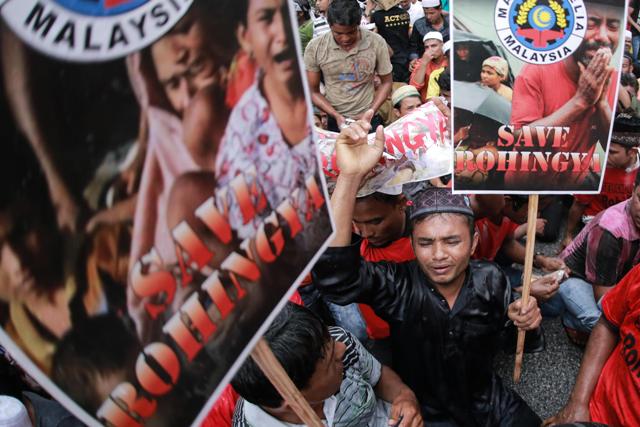 25th Nov, 2016: Muslim-Rohingya hold an assembly held in front of the Myanmar Embassy. [photo: PACIFIC PRESS/Alamy Live News]
25th Nov, 2016: Muslim-Rohingya hold an assembly held in front of the Myanmar Embassy. [photo: PACIFIC PRESS/Alamy Live News]
[This is an excerpt from an article in The Round Table: The Commonwealth Journal of International Affairs.]
This group of Twitter users did not consider the demeaning conduct of the citizens towards refugees in Malaysia. Rohingyas fled their country as they were stripped off their civil, political and economic rights, and subjected to persecution in Myanmar but they were also living in fear in Malaysia (Hamzah et al., Citation2016; Rahman & Mohamad, Citation2016; Tan, Citation2020; Wahab, Citation2018). Statements from the Rohingya refugees include them being indiscriminately spat on and shouted at, and constantly being intimidated with death threats due to their ethnicity (Rodzi, Citation2020). Rohingya refugees are also called out on Twitter for not being Islamic, and only calling themselves Muslims to get help from Malaysia. During the upsurge of Tweets against the refugee community, a local man harassed a refugee by using harsh words and demanded that he recite one of the five pillars of Islam, the shahada (a phrase that declares a Muslim’s faith towards Allah and prophet Muhammad) to prove that he is a Muslim (Free Malaysia Today, Citation2020). The local man was frustrated because the refugee was on his way to work as a grass-cutter during the MCO, and the video incited more discriminatory remarks towards the Rohingyas (ibid). Besides that, even local activists for the Rohingya were threatened with rape on Facebook after calling on the authorities to permit Rohingya refugees ashore (Ananthalakshmi & Latiff, Citation2020). It is perplexing that Malaysian Twitter users are vocal regarding the problematic behaviours of the refugees without reflecting on those of the locals.
Apart from reflecting on individual Malaysians and how they treat refugees, these users should also reflect on the treatment refugees receive from the government. It can be deduced that as a consequence of the upsurge of grievances towards the refugees on social media such as Twitter, the government changed its policies towards refugees during the pandemic. Malaysian authorities rounded up hundreds of migrants in the city of Kuala Lumpur (including Rohingya refugees and young children) on 1 May 2020 (Reuters, Citation2020). They were detained and put in overcrowded detention centres, putting them at risk of catching the virus (Straits Times, Citation2020a, Citation2020b).
Malaysia, Myanmar and Singapore: common threads, divergences, and lessons learned in responding to the COVID-19 pandemic
Commonwealth countries must do more for Bangladesh’s Rohingya refugees
Unwelcomed? The Effects of Statelessness on Involuntary Refugee Repatriation in Bangladesh and Myanmar
However, Firdaus Husni, Human Rights chief strategist of the Malaysian Centre for Constitutionalism and Human Rights argues that the anxieties of COVID-19 were used to validate xenophobic attitudes towards the Rohingya community (Rodzi, Citation2020). Malik Imtiaz Sarwar, lawyer and past president of National Human Rights Society stated that there is a reappearance of ‘political exploitation of social media’ with the current Perikatan Nasional government. Hence, resentment towards the political landscape in the country and frustrations and concerns regarding the MCO and its effects were being directed against the Rohingya. All things considered, the steps taken by the government illustrate social media as a powerful tool to convince governments to listen to the public discourse of citizens.
The type of implicit insecurity for this category of grievance would be social threats as the Tweets indicate that Malaysians associate the Rohingya refugees with having problematic social behaviour. Malaysians fear these refugees due to the stigma and discrimination echoed within the community. This grievance goes back to above-mentioned factors, such as inconsistencies of policies towards refugees of different nationalities and a lack of distinction between refugees and migrants. Revisiting the point of Malaysia being a non-signatory to the 1951 Refugee Convention, refugees do not have rights to be employed in Malaysia, which compels them to steal and beg to live. Hence, Malaysians feared for their safety and shared their experiences online, only to amplify the resentment towards the Rohingya refugee community in the process.
Nadhirah Zainal Rashid is a Postgraduate Researcher, Department of Political Science, University College London and Mohd Irwan Syazli Saidin is a Visiting Research Fellow and Academic Tutor, Institute for Middle Eastern and Islamic Studies, School of Government and International Affairs, Durham University, Durham, UK and a Senior Lecturer, Centre for Research in History, Politics and International Affairs, Universiti Kebangsaan Malaysia.



